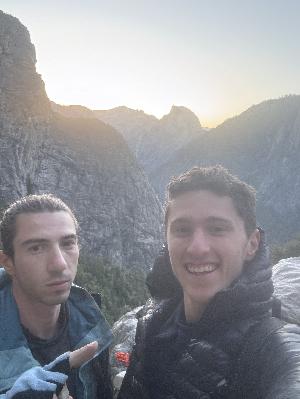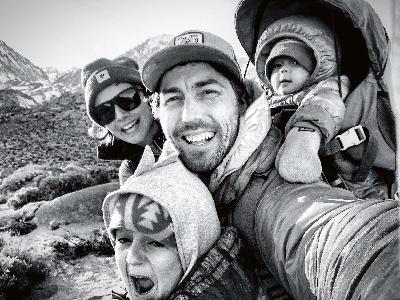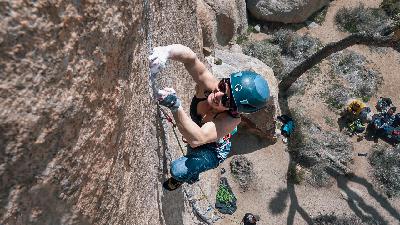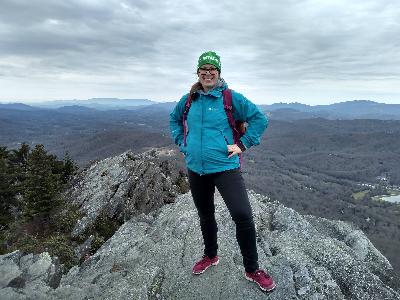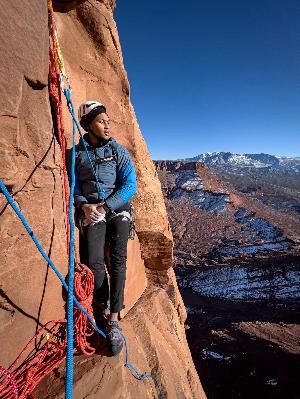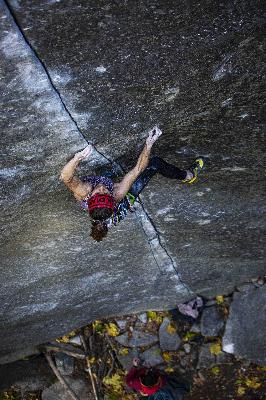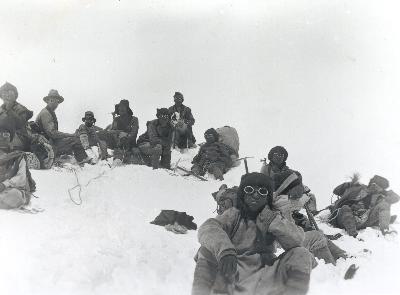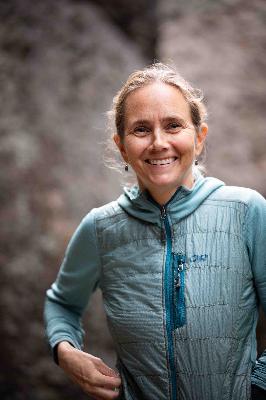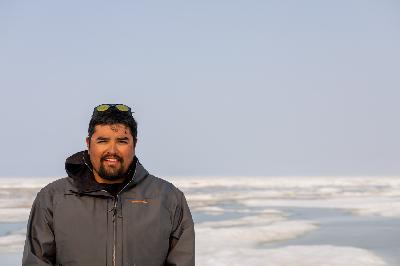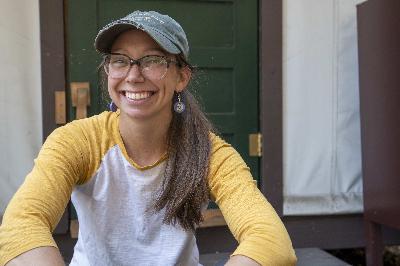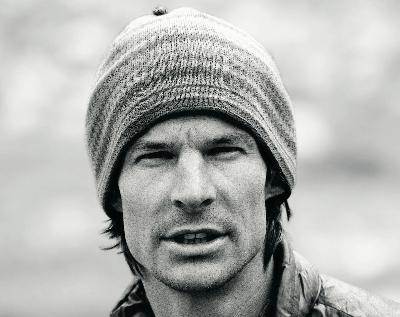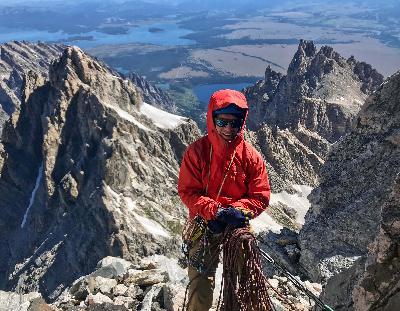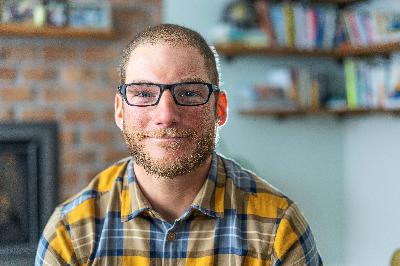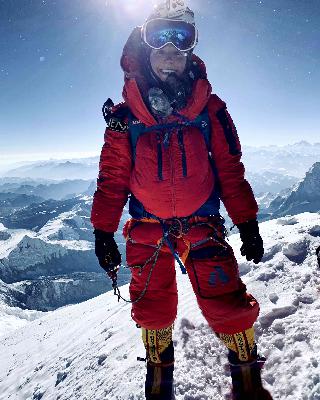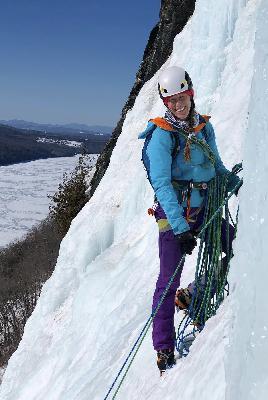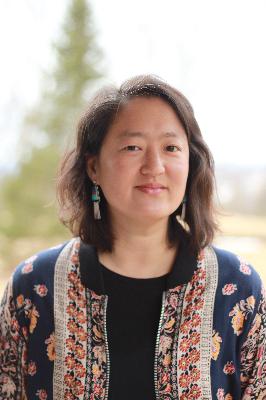Discover Alpinist
Alpinist

Alpinist
Author: Alpinist Magazine
Subscribed: 1,246Played: 14,180Subscribe
Share
Description
Since 2002 Alpinist has striven to push creative boundaries with everything we do, from award-winning climbing journalism and creative writing to photography and art. Now, with the Alpinist podcast, we aim to extend our conversations with climbers and community members into interviews and oral histories that will entertain and educate our listeners with everything from dramatic and humorous adventure tales to in-depth discussions of the most significant issues in the climbing world today. More at alpinist.com/podcast
71 Episodes
Reverse
New York City might seem like an unlikely place for a climber of Will Moss's caliber to hail from. And yet, he managed to find his way from the climbing gym, to boulders in Central Park, to runout trad routes in the Gunks and big walls in Yosemite. It was there that he recently made headlines as being the first person to flash a big wall free route on El Cap in just one day. Moss started climbing in his neighborhood gym when he was ten. For some perspective, that was only a decade ago. It was love at first climb, and he hasn't looked back since. At first, he mainly focused on indoor competition climbing. But when gyms closed during the COVID-19 pandemic he started getting outdoors more. A friend introduced him to the Gunks when he was sixteen, and, as he says, "that's where the dream of trad climbing began." Now twenty years old, Moss's 22-hour push on El Cap this May was the culmination of more than two years of planning. In this conversation, we talk in depth about the historic climbs Will is ticking off at a young age, and what he's planning next as he takes a semester off from pursuing a degree in mechanical engineering to chase his climbing dreams. This episode is brought to you with support from Rab Equipment. Host: Abbey Collins Producer & Engineer: Mike Horn Guest: Will Moss Subscribe to Alpinist Magazine
When Sonnie Trotter was a teenager, he discovered a portal into another world. Entering the local climbing gym he found challenge, adventure and passion. By sixteen, he was all in, and he made it up his first 5.14 within just a few years. The climbing seemed to come naturally, but figuring out how to make a living doing it took a lot more time—and some trial and error. Early sponsorships covered gas money for traveling to competitions, but it took him a decade to start generating real income as an athlete. He knew that his happiness was directly connected to climbing and so he did whatever he could to do it as much as he could. Looking back at the last thirty years of climbing, Trotter says he's most proud of his willingness to listen to himself and commit to his passion. He recently published "Uplifted," a memoir chronicling those many years of climbing, his role as a father and how he manages to tie it all together. In this conversation, we talk about Trotter's evolution as an athlete, where he finds freedom and why he believes climbing should be fun—even when it's not easy. This episode is brought to you with support from Rab Equipment. Host: Abbey Collins Producer & Engineer: Mike Horn Guest: Sonnie Trotter Subscribe to Alpinist Magazine Purchase Sonnie's book, "Uplifted: The Evolution of a Climbing Life" Photography courtesy of Patagonia.
While growing up in Kentucky, Mary Eden was often bored. But it was that boredom, she recalls, that helped her find meaningful interests as she explored her world. It led her to art and to adventure. She didn't discover rock climbing until she moved to Moab in her early twenties. Even then, she says she wasn't a naturally-gifted climber. But, she was determined to learn, and did whatever she needed to do to find gear, mentorship and belayers. She always had the drive, and once she learned how to properly train, Eden progressed, fairly quickly, to being one of the best crack climbers in the world. Her climbing accomplishments include Necronomicon (5.14a) and Black Mamba (5.14b). Today, Eden is a professional climber and artist. She shared the story of her life and journey into climbing in Alpinist 89, and she's featured on the cover of that issue. In this conversation, Mary talks about her growth as a climber and the beauty she finds in the holds and heights of Western landscapes, especially around her home in Moab. She reflects on what she learns about herself through climbing, especially during moments of self doubt and explains why she encourages her friends to fail as often as possible. This episode is brought to you with support from Rab Equipment. Host: Abbey Collins Producer & Engineer: Mike Horn Guest: Mary Catherine Eden Subscribe to Alpinist Magazine
Dawn Hollis has been obsessed with mountains since she was a small child growing up in Suffolk, which she describes as being "a really flat part of the UK." Her first glimpse of more elevated landscapes came at age nine on a family trip to Wales. The trip sparked a lifelong passion for being in, and studying the history of, these wild places. Later, Hollis had a school teacher who had climbed Everest, and further encouraged her love of mountains. As an adult, Hollis found a niche in researching humans' relationships to mountains and how it has changed over time. Her book "Mountains Before Mountaineering" draws on years of PhD research, and calls into question common beliefs about how peaks were viewed before the eighteenth century. In this episode, Hollis talks about the challenges she's encountered as she upended the belief that mountains were generally feared or avoided during this time. She says our appreciation for mountains pre-dates the modern era—even if historical texts theorize otherwise—and continues to evolve to this day. This episode is brought to you with support from the American Alpine Club. Host: Abbey Collins Producer + Engineer: Mike Horn Guest: Dawn Hollis Book: Mountains Before Mountaineering Subscribe to Alpinist Magazine
Kai Lightner is no stranger to the spotlight—or to this magazine. He's been climbing since he was six, when he joined the climbing team at a gym in North Carolina. Four years later Lightner won his first national title, and the wins just kept coming. In 2016, while still in high school, Lightner wrote an essay for Alpinist 55 about learning how to trad climb from Doug Robinson. A few years later, as a sophomore in college, he appeared on this podcast, in conversation with Paula LaRochelle. He had recently taken a step back from climbing and would soon found the nonprofit organization Climbing For Change. A lot has happened in Lightner's life since that last conversation. He spoke up about his struggles with eating and bodyweight as a competition climber, opening up a bigger conversation. Through Climbing for Change, he's been at the forefront of initiatives aimed at making climbing more diverse and inclusive. He traveled to Jamaica and helped build the country's first climbing wall. Lightner even tried trad climbing again, though he says it's still not really his thing. And, last year, Lightner climbed his first 5.15. In this episode, Lightner discusses the last six years, reflects on the importance of community and connection and considers the value of forgiveness. This episode is brought to you with support from the American Alpine Club. Host: Abbey Collins Producer + Engineer: Mike Horn Guest: Kai Lightner Nonprofit: Climbing for Change Subscribe to Alpinist Magazine
Last year, Babsi Zangerl did something no one has ever done before—she flashed a route on El Capitan. Thousands of feet of hard climbing with no falls. Her partner, Jacopo Larcher, came really close, taking just one fall during their ascent of Freerider. Zangerl has been a climber for over two decades, since she was a teenager at a climbing gym in Austria. But what, and how, she climbs has evolved over that time—she spent her early years as a professional boulderer. Zangerl first visited Yosemite fifteen years ago with her friend Hansjörg Auer. She was getting more serious about ropes after sustaining a serious back injury while bouldering. Since that first trip in 2010, Zangerl has returned with Larcher to free climb many of the valley's classic routes, including Zodiac, Magic Mushroom and the Nose. In 2018 the pair climbed the North Face of the Eiger. In 2022 they freed Eternal Flame on Pakistan's Nameless Tower, a trip Larcher wrote about in Alpinist 82. And their list of accomplishments just keeps growing. In this episode, Zangerl talks about the beginnings of her climbing career in Austria, her partnership with Larcher, learning the ropes from Hansjörg Auer and much more. This episode is brought to you with support from the American Alpine Club. Host: Abbey Collins Producer + Engineer: Mike Horn Photos of Basi Zangerl by Jacopo Larcher and Jonathan Faeth Subscribe to Alpinist Magazine
Rick Accomazzo came of age in the climbing world as part of the Stonemasters—a name adopted by a group of friends largely climbing in Yosemite, Tahquitz and Suicide Rocks in the 1970s. To become a Stonemaster, you had to send a 5.11 called Valhalla. Tobin Sorenson was a Stonemaster too. He was also, Accomazzo believes, the best all-around climber in the world at the time. Throughout the 70s, the Stonemasters branched out from rock to ice, and from California to the Canadian Rockies and Europe. Sorenson, Accomazzo recalled, took to alpine climbing just as well as he had to rock. It was an age of joy, fun and great physical challenges. But in 1980 Sorenson died in an accident on Mt. Alberta when he was twenty-five years old. The Stonemasters were deeply affected by the loss. They climbed on, but it was never the same. Accomazzo shares the story of his friend in his new book, Tobin, The Stonemasters, And Me: Remembering Tobin Sorenson, The Best Climber In The World. Accomazzo shares his personal experiences climbing with Sorenson and reflects on the ability, character and accomplishments that made him so singular in the climbing universe. Support for this episode of the Alpinist Podcast comes from Patagonia. Following our conversation with Rick Accomazzo, you can listen to Patagonia Ambassador Colin Haley chat with host Abbey Collins about his passion for innovation and product development, and in particular his role in developing the new M10 Storm pants. Host: Abbey Collins Producer + Engineer: Mike Horn Photo of Rick Accomazzo by Chris Van Leuven Subscribe to Alpinist Magazine at alpinist.com Buy the Book at stonemasterbooks.com
The events of one the most famous Everest stories took place a century ago, when George Mallory and Sandy Irvine disappeared during the 1924 British Mount Everest expedition. A hundred years later, a group of writers is shedding light on the many different people and worlds that have, throughout history, had an important connection to the mountain. In sixteen different essays: Other Everests: One Mountain, Many Worlds tells stories from new perspectives—of people and things that have long been overlooked. Editors Jonathan Westaway and Peter Hansen joined the Alpinist Podcast to discuss why they embarked on this project. And Sarah Pickman, who wrote one of the pieces in the Other Everests collection, discussed what we can learn from what gear and equipment was brought along on expeditions. Support for this episode of the Alpinist Podcast comes from Patagonia. Following our conversation with the Other Everests contributors, you can listen to Patagonia Ambassador Colin Haley chat with host Abbey Collins about his passion for innovation and product development, and in particular his role in developing the new M10 Storm pants. Alpinist Magazine: Website | Instagram | Facebook Book: Other Everests: One Mountain, Many Worlds Host: Abbey Collins Producer + Engineer: Mike Horn
Beth Rodden established herself as one of the best rock climbers in the world at the height of her career. Through much of that time, Rodden was quietly struggling with her mental health as she tried to move forward after she and her climbing partners were kidnapped at gunpoint during a trip to Kyrgyzstan in 2000. Now Rodden's bravery appears in new ways—she's still a professional climber, but she's also using her platform to open up conversations about body image, motherhood and finding joy in climbing in a gentler way. Support for this episode of the Alpinist Podcast comes from Patagonia. Following our conversation with Beth Rodden, you can listen to Patagonia Ambassador Colin Haley chat with host Abbey Collins about his passion for innovation and product development, and in particular his role in developing the new M10 Storm pants. Alpinist Magazine: Website | Instagram | Facebook Host: Abbey Collins Guest: Beth Rodden Producer + Engineer: Mike Horn Photo by Ryan Moon
For all of his expeditions and cutting-edge climbs around the world, Graham Zimmerman's story is one of balancing adventure and exploration with social responsibility and an examined life. His book, A Fine Line: Searching for Balance Among Mountains demonstrates that, and also serves as an ode to the friends and mentors he's lost to the mountains. Zimmerman became a professional climber at 24 years old. Now 37, Zimmerman is accomplished well beyond his years. He has made first ascents from Alaska to Pakistan, and in 2020 he received a Piolet d'Or for his climb on Pakistan's Link Sar with Steve Swenson, Mark Richey and Chris Wright. He's currently the Board President at the American Alpine Club and works for Protect Our Winters. In this episode, Zimmerman speaks to the need for systemic change when it comes to climate and social issues, and how climbers see those challenges through a unique lens. He reflects on his love for the mountains, and the sense of release and joy they provide him with. Support for this episode of the Alpinist Podcast comes from the American Alpine Club. Alpinist Magazine: Website | Instagram | Facebook Host: Abbey Collins Guest: Graham Zimmerman Producer + Engineer: Mike Horn
Dr. Len Necefer didn't grow up skiing steep slopes or topping out on summits like he does today. Instead, his connection to the outdoors began with golf—a fact he shares rather sheepishly. Necefer was an avid golfer from age five until he was eighteen, when he moved to the desert southwest and realized how water-intensive that sport is. Necefer is a member of the Navajo Nation, and is working to bring more Native voices and talents into the outdoor industry through his organization Natives Outdoors. He believes in the importance of engaging with the environment in a thoughtful, meaningful and respectful way. As a backcountry skier and climber, he cultivates connection with the mountains he visits and the people he visits them with. He is a regular Alpinist contributor. In this episode, Necefer reflects on why having a sense of humor is essential when trying to communicate about heavy subjects like climate change; what it was like teaching himself to ski; and why it's important for all of us to vote. Support for this episode of the Alpinist Podcast comes from the American Alpine Club. Alpinist Magazine: Website | Instagram | Facebook Host: Abbey Collins Guest: Len Necefer Producer + Engineer: Mike Horn
Lauren Delaunay Miller is an award-winning author, journalist and audio producer based in Bishop, California. Her first book, Valley of Giants: Stories from Women at the Heart of Yosemite Climbing, was published in the spring of 2022 by Mountaineers Books, and won the Banff Mountain Book Competition for Climbing Literature. Growing up on the East Coast, Miller says she wasn't initially an outdoorsy person. But she was inspired to start climbing while at college in North Carolina—after seeing a photo of Alex Honnold climbing Yosemite's Half Dome on the cover of National Geographic. She recalls that, at the time, she didn't even know how to pronounce "Yosemite." Since then, Miller has spent many days on Yosemite's granite walls. In this episode, Miller talks about the power of using the mountains and climbing as a vehicle to tackle stories around larger issues in society. She speaks to her love of climbing, and how it allows her to connect with people and explore human stories, communities and relationships. Support for this episode of the Alpinist Podcast comes from the American Alpine Club. Alpinist Magazine: Website | Instagram | Facebook Host: Abbey Collins Guest: Lauren DeLaunay Miller Producer + Engineer: Mike Horn
Steve House began venturing into the high mountains as a teenager, and has since built a career on climbing, guiding and coaching. By the time he published his book Beyond the Mountain in 2009, Reinhold Messner said House was "at the top of mountaineering." House's life in climbing has taken him all over the world. His most famous ascent may be the Central Pillar of Nanga Parbat's Rupal Face, a climb he completed with Vince Anderson. But he has compiled an impressive list of first ascents and new routes in Alaska, the Canadian Rockies, the Alps and the Karakoram. Steve has been a professional mountain guide since 1992, and in 1999 he became the ninth American to achieve IFMGA certification. But these days House lives in a small Austrian mountain town with his wife and two kids. In the mornings he spends time getting outside, while the later part of the day is dedicated to working with his company Uphill Athlete. He retired from professional climbing in 2020. In this episode, we revisit passages from Steve's book Beyond the Mountain, discuss fatherhood, and finding his way in his new home in Austria. We learn about the climb that drove him to focus more on training and preparation, and eventually led him to start his company, Uphill Athlete. And, we learn more about how he thinks about climbing and what it is to be human—to focus on the act of becoming rather than being. Support for this episode of the Alpinist Podcast comes from Osprey. Alpinist Magazine: Website | Instagram | Facebook Host: Abbey Collins Guest: Steve House Producer + Engineer: Mike Horn
Sarah Pickman is an encyclopedia of expedition history, in particular the gear early explorers relied on. She recently earned a PhD in history from Yale University. She's an independent scholar, editor, writer and content producer based just outside New York City. Sarah is also a contributor to Alpinist. She's written articles on expedition first aid kits and sun protection for the Tool Users section of the magazine. As it turns out, burnt cork is no substitute for sunscreen. Through her research and writing, Sarah looks at the gear explorers carried with them on their travels—to the polar regions and high-altitude mountains, as well as to tropical and arid places—and how this gear shaped their experiences and the cultural worlds they were part of. Sarah takes us on a fascinating journey to the ends of the earth and back again. We talk about the spirit of exploration and much more in this episode. Support for this episode of the Alpinist Podcast comes from Osprey. Alpinist Magazine: Website | Instagram | Facebook Host: Abbey Collins Guest: Sarah Pickman Producer + Engineer: Mike Horn
David Smart's life and work seem to intersect with climbing at every turn. He's a lifelong climber, revered route developer and the editorial director at Gripped Publishing. He's a founding editor at Gripped Magazine and has been crucial to its success and longevity for more than 25 years. Smart has published five books, including a biography of Royal Robbins that recently won the Banff Mountain Book Award for climbing literature. He also actively contributes to Alpinist, including his mountain profile on Cima Grande in Alpinist 76 and a recent story on Kodak's Brownie camera and how it impacted the representation of climbing in the media and beyond. Smart has developed more than 300 routes in the Canadian Rockies and elsewhere around the world. At age 60, he continues to climb several days a week and revels in the ambiance of his home range. In this episode, we cover a lot of ground, from his new biography on Royal Robbins, to the state of publishing and climbing media, to his passion for route development and leaving something behind for others to experience. Support for this episode of the Alpinist Podcast comes from Osprey. Alpinist Magazine: Website | Instagram | Facebook Host: Abbey Collins Guest: David Smart Producer + Engineer: Mike Horn
Justin Bowen's first time scaling walls and new routes was in a climbing gym during a friend's birthday party. It wasn't until high school, driven by persistent memories of that experience, that Bowen started climbing on a more consistent basis. Eventually, while attending college in Arizona, Bowen planned his first trip to Yosemite, where he jumped right onto the East Buttress of Middle Cathedral. He quickly realized just how much he still had to learn about building anchors and placing gear. A few years ago, Bowen met friend and mentor Mark Jenkins, who he says shared a wealth of knowledge based on his decades of climbing around the world. Bowen still climbs with and learns from Jenkins on a regular basis. In this episode, Bowen reflects on how he manages fear—both in the mountains, and in his day-to-day life. He talks about being a PhD student, and the terrifying prospect of only having two-to-three weeks off a year to pursue climbing objectives after finishing school. And he speaks to the striking similarities between the Tetons and Mt. Kenya. Tales from Bowen and Jenkins' Mt. Kenya expedition are featured in Alpinist 83. This episode is brought to you by the American Alpine Club Alpinist Magazine: Website | Instagram | Facebook Host: Abbey Collins Guest: Justin Bowen Producer + Engineer: Mike Horn
For Alan Rousseau, the allure of mountaineering is in the unknown. When he looks up at a mountain and contemplates whether it can be climbed, he sees a mystery to be solved. Rousseau is an IFMGA guide who divides his time between pursuing his own goals in the mountains, and helping others do the same. His achievements in the Alaska Range, to which he has ventured more than twenty times, include first ascents of Ruth Gorge Grinder and Aim for the Bushes. In 2020, his first ascent of the west face of Tengi Ragi Tau with Tino Villanueva was recognized as one of the year's greatest climbing achievements and the pair won a Piolets d'Or. Villanueva wrote about the climb in Alpinist 81. In this episode, Alan reflects on more than ten years of climbing in the Alaska Range, and exploratory climbs like Aim For the Bushes that he and his partners established earlier this year. He talks about the difference between planning trips to Alaska and the Himalaya, and the mountains that act as his compass. This episode is brought to you by the American Alpine Club Alpinist Magazine: Website | Instagram | Facebook Host: Abbey Collins Guest: Alan Rousseau Producer + Engineer: Mike Horn
Caroline Gleich lives on the ridgeline between adventure and activism. Her trips around the globe often transcend summit goals as she merges mountain missions with driving awareness around diversity, equality and inclusion, and environmental justice. In 2019, Caroline summited the tallest mountain in the world—with a fully torn ACL in her knee. Two years earlier, she was the first woman to ski the entirety of Utah's Chuting Gallery. But before she became a professional skier, Gleich thought she wanted to be a pro climber, after getting her start on old school sandbagged trad routes. While she ultimately pursued skiing, Gleich uses her rock and ice climbing skills to further her ski mountaineering goals. On the advocacy side, she organizes marches, protests and rallies to further the causes she believes in, and has traveled to Washington DC to lobby for Protect Our Winters. In this episode of the Alpinist Podcast, Caroline recounts her Everest expedition, challenges stereotypes around body image, and dives into the dark side of her personality and how she plans for a future full of unknowns. This episode is brought to you by the American Alpine Club Alpinist Magazine: Website | Instagram | Facebook Host: Abbey Collins Guest: Caroline Gleich Producer + Engineer: Mike Horn
For Andrea Charest, climbing is entwined with community. She and her husband Steve own Petra Cliffs, a climbing gym and mountaineering school in Burlington, Vermont, where they also work as guides. She's volunteered much of her time over the years to Crag Vermont, a nonprofit organization dedicated to conserving, protecting and advocating for climbing access in the Green Mountain State. She empowers her fellow climbers to take the lead, and has a knack for enabling others to move past their perceived limitations. Earlier this year, Charest became an AMGA-certified ice climbing instructor, a hard-earned goal years in the making. In this conversation, we talk about her journey through the ice instructor exam, and how she balances business, play and parenthood. Charest shares her love for the global climbing community, her excitement around the continued growth of Petra Cliffs, and the importance of helping climbers make the transition from the gym to the crag. This episode is brought to you by Rab Equipment Alpinist Magazine: Website | Instagram | Facebook Host: Abbey Collins Guest: Andrea Charest Producer + Engineer: Mike Horn
Poet Sarah Audsley has an elevated point of view, even when her feet are on the ground. While the Vermont-based writer and climber believes she was indeed born to write poetry, she didn't start pursuing it professionally until age 29. Before that, she traveled the world, from Africa's Mt. Kilimanjaro to Turkey's Mt. Ararat to the White Mountains of New Hampshire, before making her way back to Vermont, the state where she grew up. Audsley's work has been widely published, including her debut collection titled Landlock X. Her poetry and writing has also graced the pages of Alpinist, with poems published in issues 65 and 74, as well as an interview with Ed Roberson in Alpinist 71. In this conversation, Audsley reads two select works, reflects on the idea of elective suffering, and relishes the elevated perspective climbing provides. This episode is brought to you by Rab Equipment Alpinist Magazine: Website | Instagram | Facebook Host: Abbey Collins Guest: Sarah Audsley Producer + Engineer: Mike Horn Photos by Anne Skidmore


